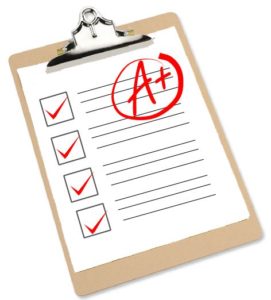Have you ever wondered about the optimum frequency of taking French tests? It’s a very interesting question.
The short answer is as often as possible. Yes, even daily, if you can get access good French tests. Testing is most effective just after you’ve learned something new.
Research published in the Journal of Educational Psychology[1] shows that students who took regular low-stakes quizzes performed 15% to 25% better in exams than those who didn’t. Several test types and timings were experimented with and “review quizzes” achieved the highest performance benefits.
Plus, a good test does more than just help you review:
- It confirms what you know and reinforces your knowledge.
- It identifies areas you don’t know so that you know what to study next
- Most importantly, it pinpoints things you think you know but in fact are getting wrong.
This last point has a unique aspect in language learning. Everyone has mislearned something or other at some point, but unlike in other disciplines, it’s highly likely you are unknowingly making some transference errors.
A good French test will identify transference errors that you are almost certainly unaware you’re making. The sooner you spot them, the better, because if you aren’t corrected, you’ll end up practising your mistakes.
Bottom line: When in doubt, take a French test!
_____________________________________
1 McDaniel, Mark A et al. “Test-enhanced learning in a middle school science classroom: The effects of quiz frequency and placement.” Journal of Educational Psychology 103.2 (2011): 399.
